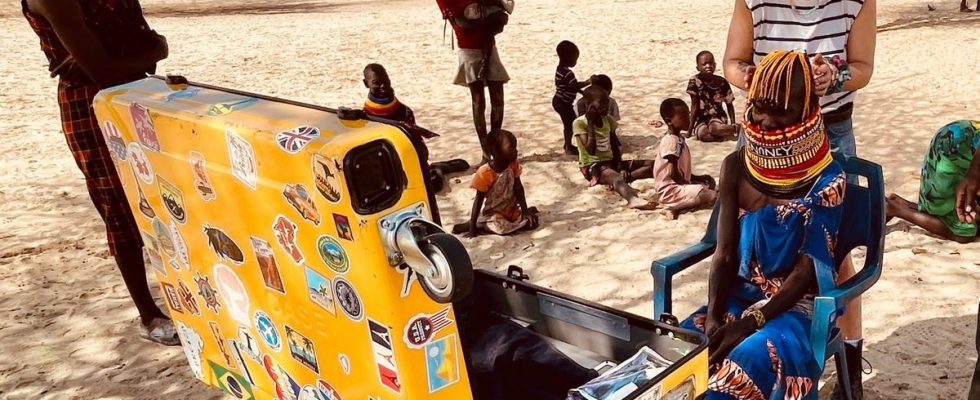Amber is in her third life. She was a singer (and even a candidate for New star in 2010), then journalist for twelve years (The Voice Kids, Kitchen nightmare, wonders, etc.). After the Covid-19, she feels the need to move on. Always passionate about hairdressing, she passed a CAP and joined a salon in eastern Paris. “Frankly, from the first shampoo, it was obvious” she enthuses. This is where TV catches up with her. Contacted by the production company Grand Angle who knows her atypical career, she becomes the face of a new documentary series. Ambre coiffure, traveling salon was selected from among 232 projects received by France Télévisions following a call for projects launched last year.
After gastronomy, architecture, transport, France 5 saw in it “a new way of discovering the world”. “Hair is both intimate and universal. It speaks to everyone, it allows to approach the history, the culture, the traditions, the rituals almost everywhere on the planet, explains Frédéric Martin, author of the series. Then there is another aspect: the hairdressing salon is a place where you feel comfortable, where you open up”. At France Télévisions, we add that “the personality of the person who embodies counts as much as the project itself”. And character, Ambre does not lack it. She is enthusiastic, passionate, empathetic, funny, and straightforward.
A “capillary release”
For those who think that talking about “hair” is superficial, just watch an episode to understand that this is not the case. Because a hairstyle says a lot about the culture of a country. Over the course of the four documentaries already in the box, we will discover how hair is a social marker in Kenya. There will also be a question of the naming ceremony, organized in a Maasai village, during which the hair of the mother and baby is cut and the whole village chooses the name of the child on this occasion. In India, Ambre realized that women didn’t really do what they wanted with their hair.
In Brazil, it will be a question, among other things, of hair transition or how certain women who grew up with the idea that one must have straight hair to be beautiful are now returning to Afro hairstyles and assuming their natural hair. Not to mention South Korea. “We thought we would find eccentricity there and we found ourselves faced with a wall of standardization and normalization, observes Frédéric Martin. Despite everything, we managed to meet people who are trying to get out of it, to marginalize themselves a little, to find their own identity and that goes through haircuts among other things”. A real “capillary liberation”, summarizes Ambre.
A yellow suitcase named Bobby
To accompany him on his travels, this all-terrain hairdresser never leaves Bobby. “Yes, my suitcase has a first name, it’s my playmate,” she laughs. This sunflower yellow luggage, covered with adhesive tape, is a tray hairdresser’s suitcase that has been re-customised and reinforced over the course of travels by trudges on all sorts of sometimes complicated roads. Ambre keeps all her hairdressing stuff there and holds a mirror inside to make a haircut anywhere, at any time. Frédéric Martin adds that the color of this accessory also attracts attention. “We are both blondes so, inevitably, it clashes”, notes the one who is delighted that the production is left to be herself in these documentaries. “In Paris, too, I stop people in the street to tell them that they have fabulous hair,” she admits.
But don’t think that after these shoots Ambre wants to go back to her old job. “I savor my rolling stool every moment! There, when I leave you, I go back to the living room because this afternoon I have a sweeping cut. There are lots of things I learned while doing this documentary series that we are not taught at CAP. This is training that no CPF account could have financed! It is the school of life, she judges. I don’t regret any of my old lives. Ultimately, this always led me to the next. I think I’m the hairdresser I am today because I was a journalist for twelve years, and because I was a singer before. »

